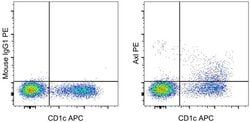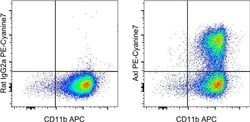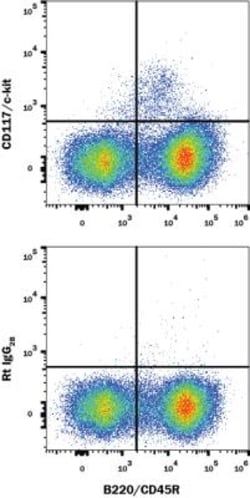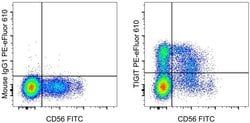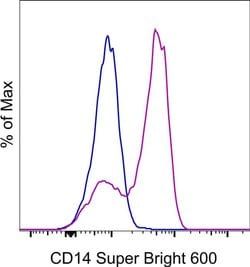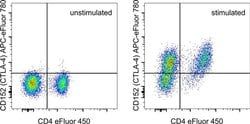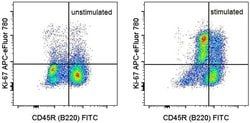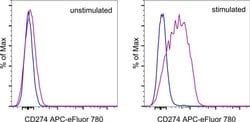MERTK Monoclonal Antibody (HMER5DS), PE-Cyanine7, eBioscience™, Invitrogen™
Mouse Monoclonal Antibody
Manufacturer: Fischer Scientific
The price for this product is unavailable. Please request a quote
Antigen
MERTK
Concentration
5 μL/Test
Classification
Monoclonal
Form
Liquid
Regulatory Status
RUO
Formulation
PBS with 0.2% BSA and 0.09% sodium azide; pH 7.2
Gene Alias
c-Eyk; c-mer; c-mer proto-oncogene tyrosine kinase; Eyk; MER; MER proto-oncogene, tyrosine kinase; MER receptor tyrosine kinase; MERTK; MGC133349; nmf12; Nyk; Proto-oncogene c-Mer; proto-oncogene tyrosine-protein kinase MER; rdy; receptor tyrosine kinase MerTK; Receptor tyrosine tinase gene probably the gene for Rdy; retinal dystrophy; RP38; sMER; sMERTK; soluble MER; soluble MERTK; STK kinase; Tyro 12; Tyro12; Tyrosine-protein kinase Mer
Gene Symbols
Mertk
Isotype
IgG1 κ
Purification Method
Affinity chromatography
Product Type
Antibody
Clone
HMER5DS
Applications
Flow Cytometry
Conjugate
PE-Cyanine7
Host Species
Mouse
Target Species
Human
Gene Accession No.
Q12866
Gene ID (Entrez)
10461
Immunogen
hMer-FC, PFA 1/2 + 1/2
Primary or Secondary
Primary
Content And Storage
4° C, store in dark, DO NOT FREEZE!
Gene
Mertk
Description
- Description: This HMER5DS antibody recognizes human MerTK, known also as Mer or c-mer, a 170-210 kDa member of the TAM family of tyrosine kinase receptors that also includes Axl and Tyro3
- MerTK is expressed on a subset of anti-inflammatory macrophages and is involved in the removal of apoptotic cells
- This process relies on two soluble ligands of Mer,TK Protein S and Gas6, that coat the surface of cells undergoing apoptosis
- Upon binding these ligands, MerTK undergoes autophosphorylation at multiple tyrosine residues that activate the PI3K and Akt pathways
- This results in the phagocytosis of target cells and also the direct inhibition of TLR-induced production of pro-inflammatory cytokines by the phagocytes
- Mer may also function as a putative entry receptor for filoviruses
- Deficiency of MerTK causes general autoimmunity, inflammation, and accumulation of apoptotic bodies
- MerTK can be released from the cell surface by metalloproteinases, and this process is significantly enhanced when macrophages are stimulated, e.g
- with LPS
- MerTK is often expressed on maligt cells, and may be implicated in immune evasion
- Applications Reported: This HMER5DS antibody has been reported for use in flow cytometric analysis
- Applications Tested: This HMER5DS antibody has been pre-titrated and tested by flow cytometric analysis of human monocyte-derived macrophages
- This can be used at 5 μL (0.06 μg) per test
- MERTK (cMER) is a tyrosine kinase proto-oncogene and is involved in the retinal pigment epithelium (RPE) phagocytosis pathway, which is implicated in human retinal disease
- Regulates many physiological processes including cell survival, migration, differentiation, and phagocytosis of apoptotic cells (efferocytosis)
- Ligand binding at the cell surface induces autophosphorylation of MERTK on its intracellular domain that provides docking sites for downstream signaling molecules
- Following activation by ligand, interacts with GRB2 or PLCG2 and induces phosphorylation of MAPK1, MAPK2, FAK/PTK2 or RAC1
- MERTK signaling plays a role in various processes such as macrophage clearance of apoptotic cells, platelet aggregation, cytoskeleton reorganization and engulfment
- Functions in the retinal pigment epithelium (RPE) as a regulator of rod outer segments fragments phagocytosis
- Plays also an important role in inhibition of Toll-like receptors (TLRs)-mediated innate immune response by activating STAT1, which selectively induces production of suppressors of cytokine signaling SOCS1 and SOCS3.

